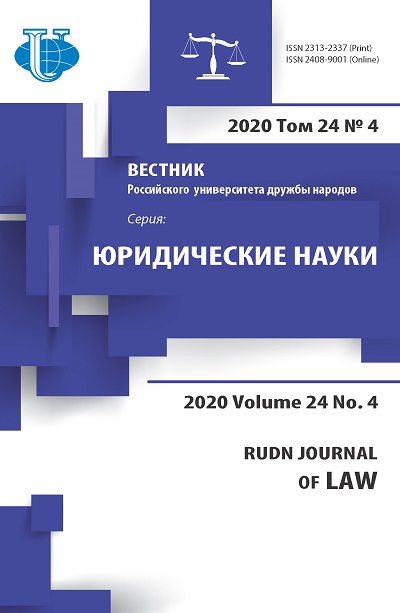ELECTRONIC CIVIL PROCEEDINGS IN INDONESIA, THAILAND, MALAYSIA
- Authors: Rusakova E.P.1
-
Affiliations:
- Peoples' Friendship University of Russia (RUDN University)
- Issue: Vol 24, No 4 (2020)
- Pages: 1122-1140
- Section: PROCEDURAL LAW
- URL: https://journals.rudn.ru/law/article/view/25256
- DOI: https://doi.org/10.22363/2313-2337-2020-24-4-1122-1140
Cite item
Full Text
Abstract
Electronic court proceedings are now becoming a prerequisite for the effective functioning of the entire judicial system. The introduction of digital technologies in the judicial process is one of the tasks of reform, and its speed, cost-effectiveness and accessibility depend on it. The research purpose of this article is to identify common positive and negative features of the process of integrating modern technologies into civil proceedings in Indonesia, Thailand, and Malaysia. It is proved that: 1) Legal regulation of application of technical means in civil proceedings are not often in line with modern realities; 2) It is necessary to create conditions to secure judicial form of protection of rights and lawful interests by means of digital technologies; 3) The judicial form of protection of rights online is a guarantee of its implementation; 4) Implementation of procedural actions with the help of digital technical means needs simplification; 5) The general trend in reforming the civil process is wider application of artificial intelligence technologies. Comparative legal analysis of foreign legislation and literature demonstrates different levels of e-justice achievement in the countries under study, among which Malaysia is a leader in integrating modern information and telecommunications technology in civil proceedings; 6) The level of implementation of the digital agenda varies depending on the type of legal proceedings.
About the authors
Ekaterina P. Rusakova
Peoples' Friendship University of Russia (RUDN University)
Author for correspondence.
Email: rusakova-ep@rudn.ru
Candidate of Legal Science, Associate Professor, Associate Professor of the Department of Civil Law and Procedural Law and Private International Law, Law Institute
6 Miklukho-Maklaya str., Moscow, 117198, Russian FederationReferences
- Ahmad Tholabi Kharlie, Achmad Cholil (2020) E-court and e-Litigation: the new face of civil court practices in Indonesia. International Journal of Advanced Science and Technology. 29 (02), 2206–2213.
- Dudin, M.N., Frolova, E.E., Kuznetsov, M.N., Drobysheva, L.V., Krasulya, E.V. (2016) “Green” logistics as an instrument for putting together a new model for professional and careerbroadening training in global economic space. International Journal of Environmental and Science Education. 11 (15), 8693–8705.
- Dudin, M.N., Frolova, E.E., Kucherenko, P.A., Samusenko, T.M., Voikova, N.A. (2016) Creating an effective system of education to prepare future human resources within the context provided by the global shift toward a “green economy”. International Journal of Environmental and Science Education. 11 (15), 8706–8717.
- Dudin, M.N., Shakhov, O.F., Shakhova M.S., Rusakova E.P., Sizova, Yu.S. (2019) Digital technologies as a driver of intellectual stratification of human resources: socio-economic inequality. International Journal of Recent Technology and Engineering (IJRTE). 8 (2), Retrieval Number, 4436–4440.
- Frolova, E.E. (2017) Financial system of Malaysia: the concept of financial dispute. MIR (Modernizatsiia. Innovatsii. Razvitie) = MIR (Modernization. Innovation. Research). 8(4), 516– 521. doi: 10.18184/2079-4665.2017.8.4.516-521. (in Russian).
- Gaivoronskaya, Ya.V., Miroshnichenko, O.I., Mamychev, A.Yu. (2019) Immodest charm of digitalization. Legal Concept. 18 (4), 40–47. (in Russian).
- Edwin Lee, Yong Cieh (2018) Special cyber court and E-Court, available at: https://gltlaw.my/ 2018/05/24/special-cyber-court-and-e-court/ (Accessed 21 June 2020).
- Eri Hertiawan, Jesconiah (2019) E-Court registration is now mandatory for civil cases, client update: Indonesia, June, available at: https://id.rajahtannasia.com/media/3431/ ahpclientupdate-27june2019.pdf (Accessed 10 June 2020).
- Ermakova, E.P. (2015) Grazhdanskii protsess, arbitrazh i mediatsiya v Gonkonge, Indonezii, Malaizii, Singapure i Filippinakh [Civil Procedure, Arbitration and Mediation in Hong Kong, Indonesia, Malaysia, Singapore and the Philippines]. Monograph. Ser. Civil and Arbitration Procedure. Moscow, Yurlitinform Publ. (in Russian).
- Inshakova, A.O., Frolova, E.E., Rusakova, E.P., Kovalev, S.I. (2020) The model of distribution of human and machine labor at intellectual production in industry 4.0. Journal of Intellectual Capital. 21 (4), 601–622, https://doi.org/10.1108/JIC-11-2019-0257.
- Kamal, H.H., Maizatul, F.M. (2011) The E-court system in Malaysia, 2nd International Conference on Education and Management Technology IPEDR. (13), pp. 240–244.
- Khabrieva, T.Y. (2018) Law facing the challenges of digital reality. Journal of Russian Law. 9 (261), 5–16. doi: 10.12737/art_2018_9_1. (in Russian).
- Kuznetsov, M.N. (2020) The impact of digitalization on some guidelines for civil procedure. Vestnik of Moscow City University. Series «Legal Sciences». 2(38), 58–67. DOI 10.25688/ 2076-9113.2020.38.2.06. (in Russian).
- Kancvalskul, L., Ebrahim, P., Yiamsamatha, W., Chantara-opakorn, O. (2018) The dispute resolution review — edition 10. The law reviews, available at: https://thelawreviews.co.uk/ chapter/1166520/thailand (Accessed 10 June 2020).
- Murti, P. (2019) Electronic proceedings through E-Court system in Indonesia, legal news & analysis — Asia pacific — Indonesia — dispute resolution, available at: http://www.conventus law.com/report/electronic-proceedings-through-e-court-system-in/ (Accessed 29 June 2020).
- Murti, P. (2019) Еlectronic proceedings through E-Court system in Indonesia. Ashurst, available at: https://www.ashurst.com/en/news-and-insights/legal-updates/electronic-proceedingsthrough-e-court-system-in-indonesia/ (Accessed 29 June 2020).
- Zankovsky, S.S., Dudin, M.N., Zinkovsky, S.B., Frolova, E.E., Kirsanov, A.N. (2018) Studying concepts of the breakthrough economic reforms in selected developed and developing countries and regions of the world: economic and legal aspect. Journal of Advanced Research in Law and Economics. (9) 4, 1236–1242.
- Zuhairah, A.A.Gh., Rabiatul, A.M.A. (2019) E-court system in the civil and shariah courts: Malaysia perspective, available at: https://www.tatiuc.edu.my/assets/files/ICTM19Papers/ICTM-70.pdf. (Accessed 23 June 2020).
- Vlasenko, N.A. (2011) Reasonableness and law: connection of phenomena and ways of research. Journal of Russian Law. 11(179), 45–57. (in Russian).
















